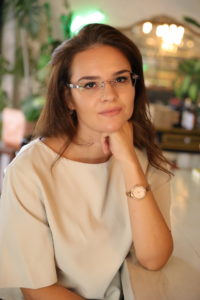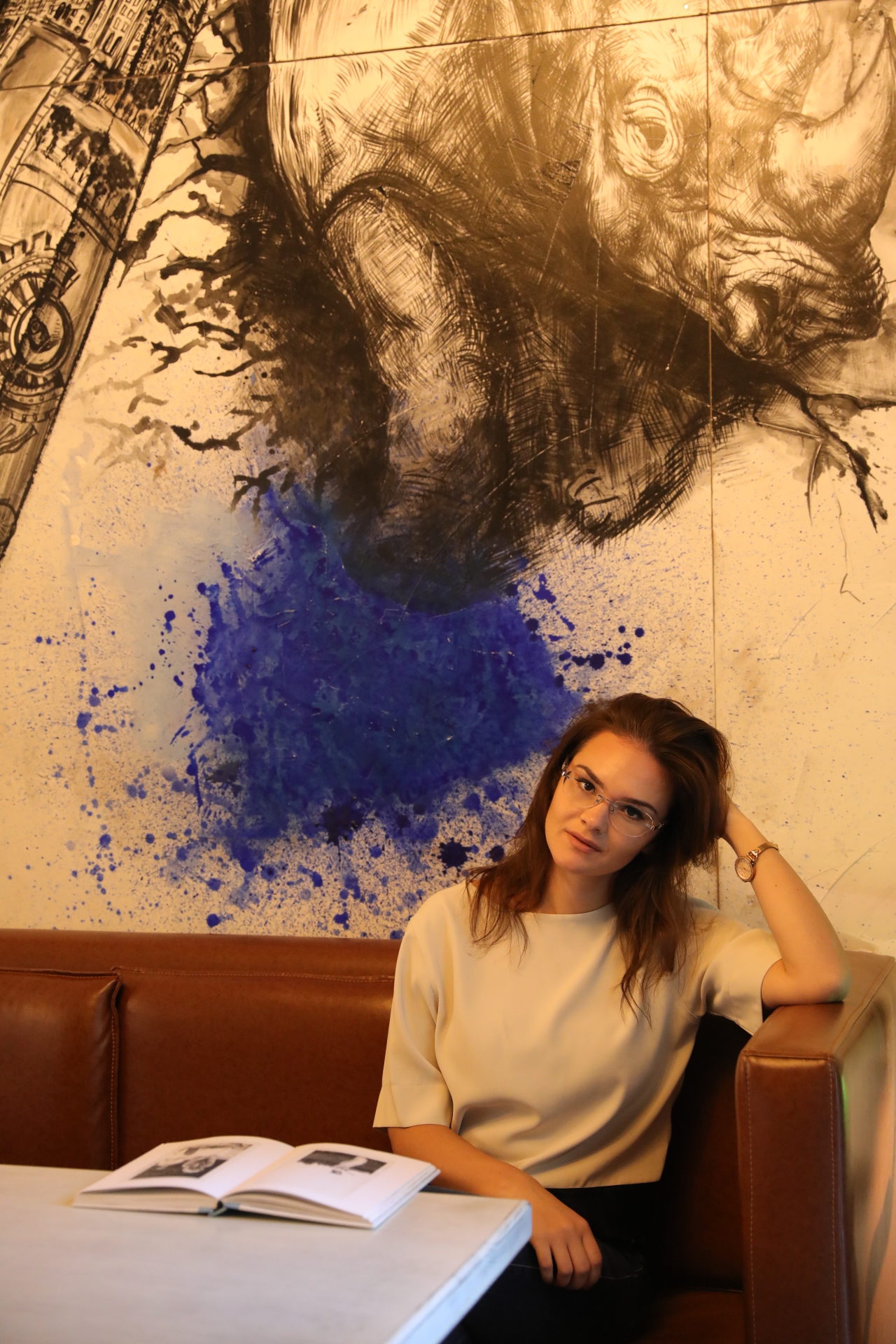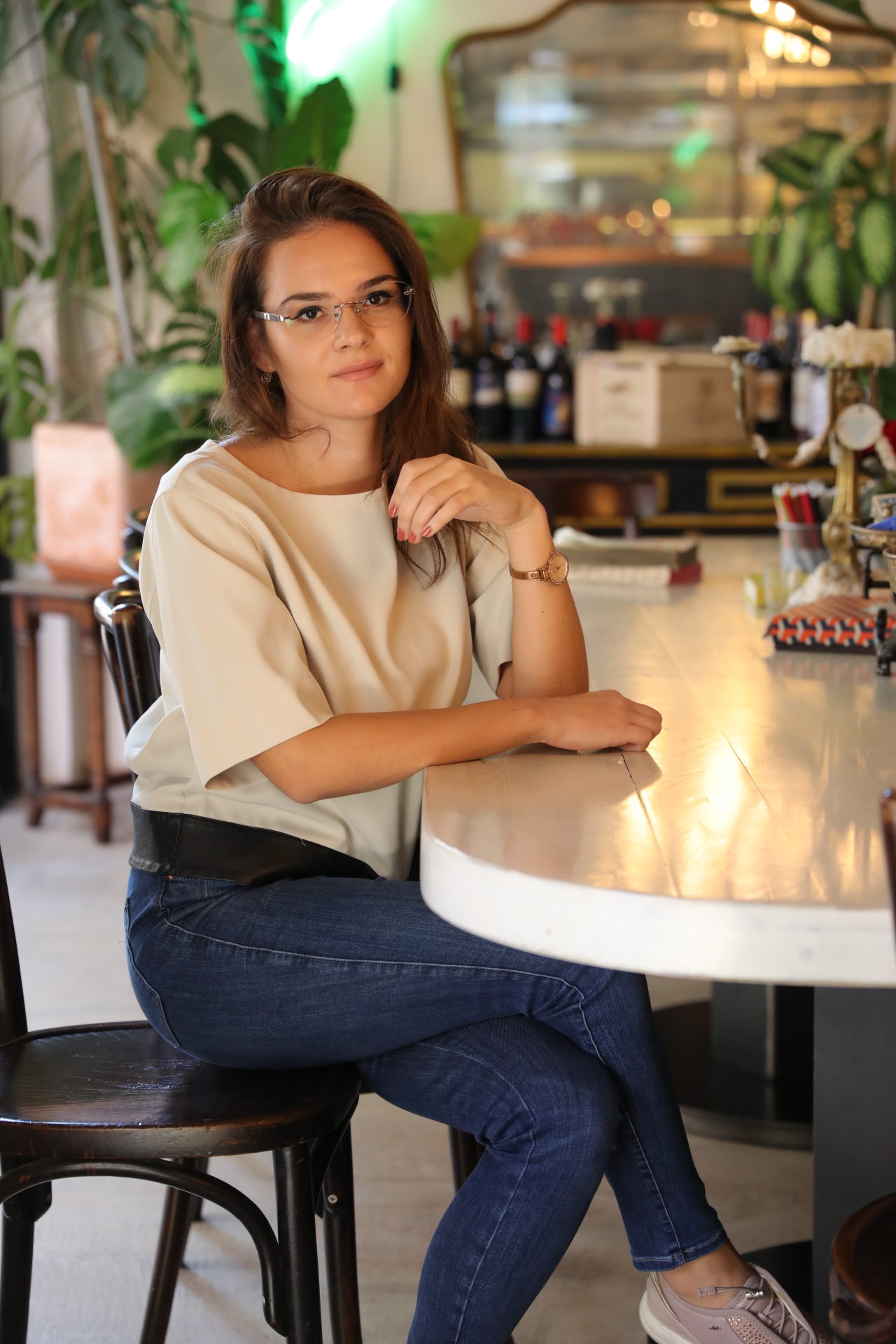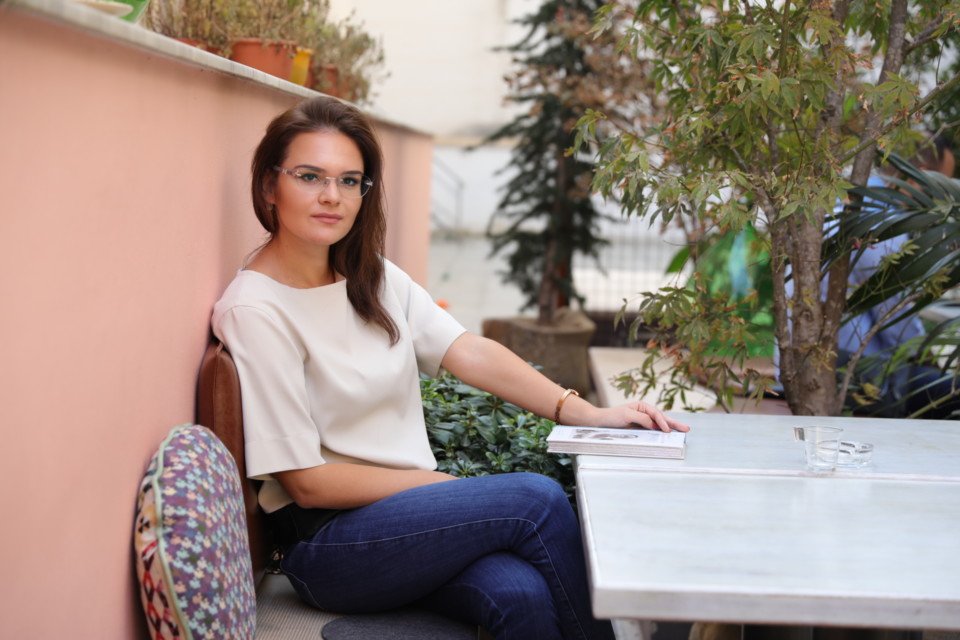K R I S I
Tirana | 2019

K R I S I
City — Tirana
Age — 27
Love life — Single
Profession — Lawyer
Years in Tirana — 25
Location — Café Teduktu
T H E T I R A N A S T O R I E S
‘IT FRIGHTENS
ME THAT
PEOPLE GET
HOPELESS
AND LEAVE’

- What makes you happy?
“Being with my family and seeing that my father, mother and sister are happy. Their happiness is key to my own happiness. They’re always positive, even during the hardest times. When I have problems, but feel their positive energy and see their happy faces, I know my sadness will pass.”
- What is your best personality trait?
“Integrity. If you tell me something, I won’t discuss it with anybody else. And professionally I will never trade my values to get something in return. I’m specifically saying this because I live in Albania. Here people’s values don’t always matter when they want something. But at the end of the day I want to know that I haven’t done anything bad to anyone else, or myself. That’s more important than my career or money. A lot of people make different decisions. But the things you achieve easily, you will lose just as easily.”
- What makes you different than other people?
“I think I’m at peace with myself. My happiness comes from within. Especially here in Tirana, being with someone or having a relationship is a status symbol. You can have a career or be good-looking, but if you don’t have someone special in your life, people think you’re lacking something. I believe I’m better off alone unless I can be with someone who shares my values. It is hard to find a partner around here, because women outnumber men. And the mentality is different than in other countries. Men don’t really ask you out, but approaching a guy is not common either, so you find yourself hesitant to talk to someone. The men here are evolving slowly, but most are still looking for a more traditional girl or a girl that will feed their ego. I’m not looking for that. I want a life friend who will lift me up, and vice versa. Of course, a wife has certain duties, but so does a husband. We are equal.” - What is your biggest struggle?
“Facing people who don’t understand me. You want to avoid them because you have nothing in common, and yet you might have to work with them, or they could be your neighbours. That’s life. I am normally laid-back and relaxed, but when people treat me or others arrogantly, I will let them know it’s not the proper way to behave.” - What is your biggest disappointment?
“I have made a few wrong decisions in life and that’s ok, that’s the process of growing up, but the fact that I disappointed my parents, for example when I didn’t follow their advice, makes me sad.
My family is everything, they are the meaning of life to me. They’ve always been so supportive of me and my sister. When the communist regime fell in 1990, my father became unemployed at 40 and had to take up a whole new profession. He used to have an important job for the ministry, but then he moved to Athens and got into heavy construction work, like so many immigrants do. That way he managed to make some money and give us a decent life. Now he is 68 years old and still working, at customs, because he doesn’t want to lower my or my sister’s standard of living. I feel bad about it, but he says he likes his job and still wants to contribute to society.”

- What advice would you give to other women in Europe?
“Trust yourself. Everything should start from there, because you have control over what happens in your life. So don’t look for someone else to make you feel accomplished, do it yourself. Here in Albania, many young girls are driven by the ideal of finding some guy, marrying him, having children and that’s it. For some girls, it’s ok. But those who don’t feel it’s what they want, shouldn’t have to follow this ‘rule’ set by society or family.
On the other hand, we have to be realistic. For some girls from poor families the only way out is if someone else takes care of them financially. As sad as it is, it’s very, very difficult for them to make it on their own. Only a few succeed. Unfortunately we have this trend in Tirana where women go and get plastic surgery, hoping that when they look more appealing some guy will give them a higher standard of living, or their boss will give them a promotion. It’s very problematic. And the sad thing is, I don’t think those girls get that far when everything is based on their appearance. When you go out, you’ll see those girls dress and behave in a sexualized way, like escorts. They think that’s how they’re supposed to act. They expect someone to pay for their vacation because they are good-looking. We are having a crisis within our families at the moment because married men spend their time and money on those girls. The number of divorces is getting higher and higher by the day. Although getting a divorce because you are unhappy is a luxury. So women here mostly opt for divorce when their husbands are abusive and violent towards them and their children. Some men are just bad, although in certain rural areas with high unemployment men became abusive because they started drinking and taking drugs due to the lack of financial resources. Not that that’s an excuse. A lot of women hesitate to go to the police. Maybe because they’re afraid, or because they feel like the state will not defend them.”
- What is your biggest fear?
“Something bad happening to my family. And not having the strength to overcome difficult situations. Sometimes I think it’s because I lack the strength that religion can offer you. When there are things you can’t explain, it must be nice to look to something higher. People here don’t feel attached to any kind of religion anymore. Religions were banned during the communist system and the dictator destroyed most of the mosques and churches. These days it’s irrelevant what religion you consider yourself, because no one knows how to practice their faith anymore.” - What are you insecure about?
“Many, many things. I deal with insecurities all the time. I am not proud of it, but I’m aware that I’m that kind of person who worries about what other people will think. For me, having a good reputation and respect from others is very important. Even when I don’t feel like it, I will greet my neighbours. Sometimes we have to do something just for the sake of being nice and spreading positivity.” - What can hurt you most?
“I can. I’m my own greatest enemy, I’m so afraid of myself and my mistakes. I’m scared that I hurt myself when I’m not acting as I should. That I’ll make bad decisions that I can’t turn back. I expect certain things from myself, and I can be tough on myself.” - What does Tirana mean to you?
“A lot, I grew up here. The city is exhausting, but fascinating. The traffic and chaos are overwhelming, but you meet well-educated people as well as people who come from rural areas and have different values.
It makes me sad that my country has so many major problems. There are such big differences in standard of living. Some people have a good life, while others are struggling for basic needs. Most young people are unemployed or work at call centers. It frightens me that people become hopeless and leave the country. Who knows whether I’ll be in their situation a couple of months from now? I think there’s always hope, but right now we are not in the best shape. The economic crisis in Greece had a great impact on Albania, because most of the income in our country was brought in by Albanians who worked in Greece. So it’s not only about our bad government and corrupt politicians. It’s so difficult to change this system. There are people in parliament who have a criminal record, for murder even, and judges and prosecutors who are wealthy because they can be bought. So who is going to help citizens fight this? Who? It makes me feel powerless, like I have a mountain in front of me. You know that some people with power will use it for bad things. Every day I fear things happening in my country.
It makes me happy that personal relationships are still very important in Tirana. The people here are friendly, warm and real. If they’re being nice to you, that comes from the heart. In Western Europe people are very calm and measured and look like they don’t have emotions. Albanians will cry and scream and show it to you when they feel tired, happy or sad. Sometimes it’s bad, sometimes it’s good, but it’s how it is. We also have the ability to reinvent ourselves and adjust ourselves to a different lifestyle. We showed it after the fall of the communist system, and the people who are leaving the country are showing it now – abroad they have to start life from scratch. Albanians are brave and strong people.”
Photos by Bora Dervishi

